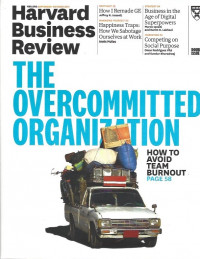
Text
Harvard Business Review: Vol. 5 September - October 2017
When Jeff Immelt announced that he was stepping down as chief executive of GE, the Wall Street view of his tenure was tepid. Analysts acknowledged his leadership through 9/11 and the Great Recession. But some also hammered him for the 30% decline in GE’s share price and noted that the company’s stock was the worst-performing component in the Dow Jones Industrial Average. Those points, while fair, obscure a bigger one: Immelt utterly remade the organization he inherited from Jack Welch. In “How I Remade GE,” which anchors our Spotlight package, Immelt calls the organization’s revamping “the most consequential makeover in its history.” The company Welch handed him was a productivity machine, a colossus of disparate businesses. But, Immelt says, “I believed that the company couldn’t simultaneously be good at media, pet insurance, and making jet engines.” He set out to fashion a simpler organization focused on industrial businesses—GE’s traditional strength, where the company’s enormous scale could drive growth. In the same way that Welch embodied a certain approach to leadership, Immelt embodied the evolving thinking about leadership and management. Having exited financial services, media and entertainment, and appliances, he invested in wind turbines and other high-margin businesses that run on exceptionally long cycles. He also made a bold bet on digitization. His vision took 16 years to implement and will take more time to play out. Others complain about short-termism, but Immelt did something about it.
The containts of this series talking about:
1. When Hiring Execs, Context Matters Most
2. We Look Like Our Names
3. Audacious Philanthropy
4. Could Your Personality Derail Your Career?
5. Happiness Traps: How We Sabotage Ourselves at Work
6. Management Is Much More Than a Science
7. Souq.com’s CEO on Building an E-Commerce Powerhouse in the Middle East
8. Leading Transformation
9. The Overcommitted Organization
10. The Surprising Power of Online Experiments
11. Managing Our Hub Economy
12. Competing on Social Purpose
13. Comp Targets that Work
14. Why Do We Undervalue Competent Management?
15. When it’s Time to Expand Beyond the Base
16. Life’s Work: Michael Strahan
Ketersediaan
| B00312 | 650.05 HAR | My Library | Tersedia |
Informasi Detail
- Judul Seri
-
-
- No. Panggil
-
650.05 HAR
- Penerbit
- Boston, Massachusetts : Harvard Business School Publishing., 2017
- Deskripsi Fisik
-
p. 1-156 : illustration; 27 cm.
- Bahasa
-
English
- ISBN/ISSN
-
073361648037
- Klasifikasi
-
650.05
- Tipe Isi
-
text
- Tipe Media
-
unmediated
- Tipe Pembawa
-
volume
- Edisi
-
Vol. 5 September - October 2017
- Subjek
- Info Detail Spesifik
-
-
- Pernyataan Tanggungjawab
-
The views expressed in articles are the author's and not necessarily those of Harvard Business Review.
Versi lain/terkait
Tidak tersedia versi lain
Komentar
Anda harus masuk sebelum memberikan komentar
 Karya Umum
Karya Umum  Filsafat
Filsafat  Agama
Agama  Ilmu-ilmu Sosial
Ilmu-ilmu Sosial  Bahasa
Bahasa  Ilmu-ilmu Murni
Ilmu-ilmu Murni  Ilmu-ilmu Terapan
Ilmu-ilmu Terapan  Kesenian, Hiburan, dan Olahraga
Kesenian, Hiburan, dan Olahraga  Kesusastraan
Kesusastraan  Geografi dan Sejarah
Geografi dan Sejarah  E-Book
E-Book